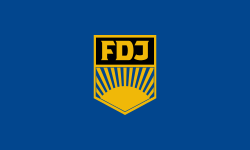| Free German Youth Freie Deutsche Jugend | |
|---|---|
 Emblem of the Free German Youth | |
 Flag of the Free German Youth | |
| Chairman | Kattrin Kammrad |
| Founded | March 1946 |
| Merger of | |
| Headquarters | Karl-Liebknecht-Haus, Berlin |
| Membership | 2.3 million (1981) |
| Ideology | Communism Marxism–Leninism (until 1990) |
| Mother party | Socialist Unity Party of Germany (until 1990) |
| National affiliation |
|
| International affiliation | WFDY |
| Newspaper | Fanfare |
| Website | www |
The Free German Youth (German: Freie Deutsche Jugend; FDJ) is a youth movement in Germany. Formerly, it was the official youth wing of the German Democratic Republic (GDR) and the Socialist Unity Party of Germany.[1]
The organization was meant for young adults, both male and female, between the ages of 14 and 25 and comprised about 75% of the young adult population of former East Germany.[2] In 1981–1982, this meant 2.3 million members.[3] After joining the Thälmann Pioneers, which was for school children between ages 6 to 13, East German youths would usually join the FDJ.[4]
The FDJ was intended to be the "reliable assistant and fighting reserve of the Worker's Party", while Socialist Unity Party of Germany was a member of the National Front and had representatives in the People's Chamber.[5] The political and ideological goal of the FDJ was to influence every aspect of life of young people in the GDR, distribute Marxist–Leninist teachings and promote communist behavior.[6] Membership in the FDJ was nominally voluntary. However, those who did not join lost access to organized holidays, and found it difficult (if not impossible) to be admitted to universities, pursue chosen careers, etc. The majority of youths who refused to join did so for religious reasons.[5]
While the movement was intended to promote the Marxist-Leninist ideology among the young adults of East Germany, it did not concentrate on this to the exclusion of other activities. It arranged thousands of holidays for young adults through its Jugendtourist agency and ran discos and open-air rock concerts.[5] The Festival of Political Songs was an officially sponsored event from 1970 to 1990.
- ^ "East Germany". Lcweb2.loc.gov. Retrieved 9 February 2013.
- ^ "Free German Youth 1949–1990 (East Germany)". Flagspot.net. Retrieved 9 February 2013.
- ^ Dirk Jurich, Staatssozialismus und gesellschaftliche Differenzierung: eine empirische Studie, p.32. LIT Verlag Münster, 2006, ISBN 3825898938
- ^ "The Rules of the Thälmann Pioneers". Calvin.edu. Retrieved 9 February 2013.
- ^ a b c "young pioneers : East Germany". Histclo.com. Retrieved 9 February 2013.
- ^ "Encyclopaedia: Freie Deutsche Jugend, FDJ (Free German Youth Organisation) – Chronik der Wende". Chronikderwende.de. Retrieved 9 February 2013.